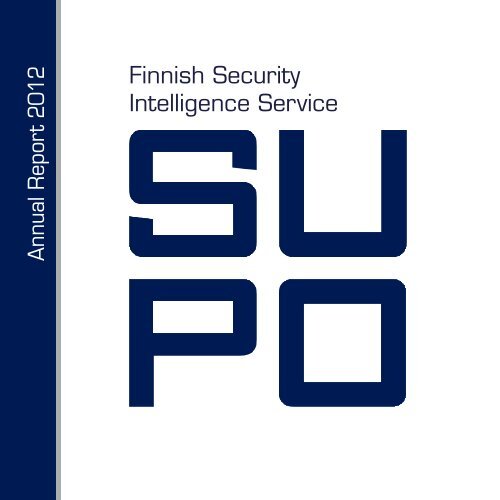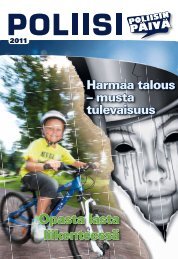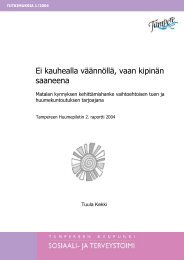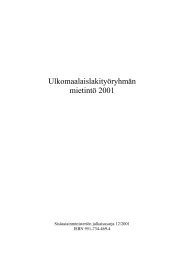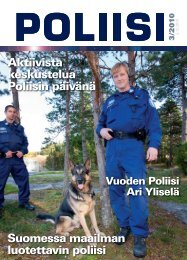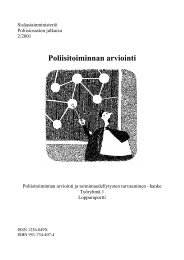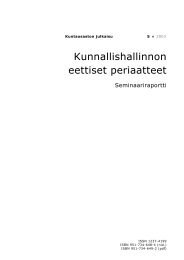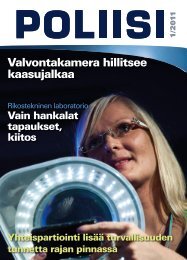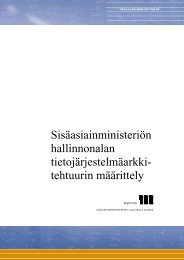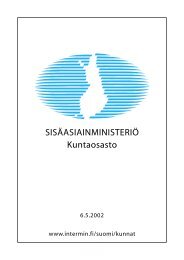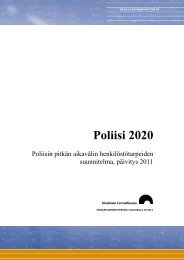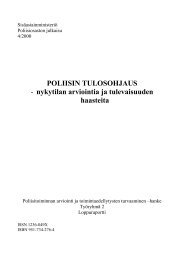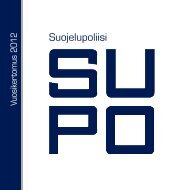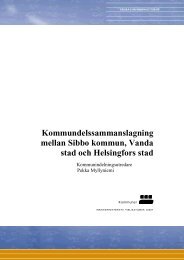Finnish Security Intelligence Service - Poliisi
Finnish Security Intelligence Service - Poliisi
Finnish Security Intelligence Service - Poliisi
You also want an ePaper? Increase the reach of your titles
YUMPU automatically turns print PDFs into web optimized ePapers that Google loves.
Annual Report 2012<br />
<strong>Finnish</strong> <strong>Security</strong><br />
<strong>Intelligence</strong> <strong>Service</strong><br />
1
Director’s review 2012<br />
Changes in operating<br />
environment are<br />
accelerating<br />
For the <strong>Finnish</strong> <strong>Security</strong> <strong>Intelligence</strong> <strong>Service</strong>, the year<br />
2012 was, if possible, even busier than the previous<br />
ones. Events causing the need to increase both<br />
the preparedness and level of action were faced in<br />
all operational fields. As our principle is to operate<br />
preventively and our operational activity is practically<br />
non-public, a significant part of the work done by the<br />
<strong>Finnish</strong> <strong>Security</strong> <strong>Intelligence</strong> <strong>Service</strong> is not visible to<br />
the public.<br />
The strategy and mission of the <strong>Finnish</strong> <strong>Security</strong><br />
<strong>Intelligence</strong> <strong>Service</strong> were updated in 2012 as a<br />
continuation of Supo’s reforming work started earlier.<br />
According to our updated mission, the <strong>Finnish</strong> <strong>Security</strong><br />
<strong>Intelligence</strong> <strong>Service</strong> produces through its operational<br />
work and cooperation analysed and up-to-date<br />
security information for the benefit of <strong>Finnish</strong> society.<br />
Information obtained in various ways and its professional,<br />
well-timed use for the benefit of the security of<br />
Finland is the cornerstone of our operation. Updating<br />
the mission does certainly not revolutionise the activity<br />
of the <strong>Finnish</strong> <strong>Security</strong> <strong>Intelligence</strong> <strong>Service</strong> but it<br />
helps us to concentrate on the essentials even better<br />
than before.<br />
In 2012, a large reform project – Pora III – has<br />
kept the whole police administration busy. This process<br />
will bring about considerable changes to the<br />
administration of the police, and the <strong>Finnish</strong> <strong>Security</strong><br />
<strong>Intelligence</strong> <strong>Service</strong> is also required to make its<br />
functions more efficient, especially the administrative<br />
ones, although the concrete aims concerning the<br />
<strong>Finnish</strong> <strong>Security</strong> <strong>Intelligence</strong> <strong>Service</strong> are not big in<br />
euros. More generally speaking, Pora III will affect the<br />
agency’s functions significantly because all units must<br />
achieve big savings at the same time as the operating<br />
environment is changing rapidly from Supo’s<br />
perspective. The functions of the <strong>Finnish</strong> <strong>Security</strong><br />
<strong>Intelligence</strong> <strong>Service</strong> and those of the other police<br />
units must, however, not be set against each other<br />
in any way. In this sense, too, Pora III has made the<br />
situation clearer: according to the final report of the<br />
project, the <strong>Finnish</strong> <strong>Security</strong> <strong>Intelligence</strong> <strong>Service</strong> has<br />
no operational duties that overlap with those of other<br />
police units.<br />
Since the beginning of 2013, the Situation Centre<br />
of the Government has operated entirely under the<br />
Prime Minister’s Office. Supo has answered for the<br />
Situation Centre services for the last four years on<br />
the basis of a separate agreement between the<br />
2
2012<br />
Prime Minister’s Office and the Ministry of the Interior.<br />
I would like to thank the Situation Centre personnel<br />
for the important contribution they have made in<br />
different ways for the benefit of the <strong>Finnish</strong> <strong>Security</strong><br />
<strong>Intelligence</strong> <strong>Service</strong> during these years.<br />
The threat posed by illegal intelligence to Finland<br />
has not decreased and is not about to do so in the<br />
near future. As the significance of economy continues<br />
to grow, high technology and its applications as<br />
targets for intelligence gathering are an increasingly<br />
important issue also for Finland’s future. “Traditional”<br />
espionage has also remained at least on the same<br />
level as before. Cases published in different EU member<br />
states have considerably increased the media<br />
coverage of illegal intelligence. This serves as a good<br />
reminder of the fact that this form of state activity<br />
still needs to be taken seriously also in Finland.<br />
The national cyber security strategy recently approved<br />
by the Government aims to ensure that Finland<br />
will be able to secure its vital functions against<br />
cyber threat in all situations. In connection with the<br />
strategy’s implementation, it must be guaranteed<br />
that authorities have sufficient legislative powers as<br />
well as practical means for performing their duties.<br />
In my opinion, the <strong>Finnish</strong> <strong>Security</strong> <strong>Intelligence</strong> <strong>Service</strong><br />
has a crucial role here as an authority safeguarding<br />
the operational prerequisites of the society.<br />
In 2012, the <strong>Finnish</strong> <strong>Security</strong> <strong>Intelligence</strong> <strong>Service</strong><br />
made a detailed assessment of individuals posing a<br />
terrorist threat in Finland. The significant growth in<br />
the number of risk persons and increased travelling<br />
from Finland to crisis areas make it necessary to<br />
invest more in terrorism prevention. In 2012, the<br />
<strong>Finnish</strong> <strong>Security</strong> <strong>Intelligence</strong> <strong>Service</strong> concentrated<br />
its counterterrorism-related liaison officer activity in<br />
the <strong>Finnish</strong> embassy in Nairobi, Kenya. Furthermore,<br />
the laborious and extensive pre-trial investigation of<br />
Finland’s first terrorist offence progressed in 2012<br />
in very good cooperation with the National Bureau of<br />
Investigation.<br />
In the annual report of 2011, I wrote that the<br />
<strong>Finnish</strong> <strong>Security</strong> <strong>Intelligence</strong> <strong>Service</strong> must perform in<br />
a way that safeguarding internal and external security<br />
of the society and preventing threats in advance are<br />
considered worth the investment. In 2012, I have<br />
witnessed constant commitment, responsibility and<br />
flexibility in the work done by Supo’s employees for<br />
the benefit of security in Finland. It is easy to be<br />
proud of this team.<br />
The concrete duty of the <strong>Finnish</strong> <strong>Security</strong> <strong>Intelligence</strong><br />
<strong>Service</strong> is to protect the governmental and<br />
social systems of Finland. Our personnel has the professional<br />
skills and experience needed in this work,<br />
and they adhere to the Nordic rule of law. Surveys<br />
conducted already for years show that the work done<br />
by Supo receives solid and continuous support also<br />
from different social groups. The experiences and examples<br />
from the other Nordic countries alone during<br />
the last few years have confirmed my impression that<br />
adequate resources ought to be allocated for this<br />
work also in Finland – keeping in mind that preventing<br />
damages in advance is a much better alternative for<br />
society than repairing them afterwards.<br />
Antti Pelttari<br />
Director of the <strong>Finnish</strong> <strong>Security</strong> <strong>Intelligence</strong> <strong>Service</strong><br />
3
2012<br />
The future will be different<br />
In 2030, the world will be very different from today’s<br />
world. According to some recently published<br />
international assessments, the changes will also<br />
have a significant impact on security. The <strong>Finnish</strong><br />
<strong>Security</strong> <strong>Intelligence</strong> <strong>Service</strong> monitors and tries to<br />
foresee the security situation and factors affecting<br />
it both in Finland and abroad.<br />
The Russian President Vladimir Putin estimated<br />
in his annual state of the nation address in December<br />
2012 that the world is about to enter<br />
an era of change. The new balance of economic<br />
systems, civilizations and armed powers poses<br />
threats to the sovereignty of states. International<br />
competition for natural resources, energy, technologies<br />
and knowhow is getting fierce, resulting<br />
in an even clearer division of states into “winners”<br />
and “losers”. According to Putin, the increasingly<br />
unequal global development lays a foundation for<br />
new conflicts of economic, geopolitical and ethnic<br />
nature.<br />
In the United States, a report ( 1 ) predicting what<br />
kinds of megatrends will be dominant in 2030 was<br />
published in December 2012. According to the<br />
report, the significance of individuals will increase<br />
substantially during the next 15–20 years. For<br />
the first time in the history of mankind, a majority<br />
of the world’s population will no longer be poor,<br />
thanks to expanding economy, growth of the global<br />
middle class, greater educational attainment, and<br />
better health care. The middle class will be the<br />
most important social and economic actor in the<br />
majority of countries. Consumption will increase<br />
and the use of new communication devices extend,<br />
leading to better access to information.<br />
Power will be widely dispersed between different<br />
states on the one hand, and between states and<br />
non-state actors on the other. No individual state<br />
will have the hegemony. Measured by a global<br />
power index, Asia will have surpassed the USA<br />
and Europe combined by 2030, whereas China will<br />
have the largest economy in the world considerably<br />
earlier. The future internet giants (cf. Google<br />
and Facebook today) will have in their possession<br />
more real-time information on individuals than governments<br />
will. Nuclear weapons might be used in<br />
future conflicts taking place especially in Asia and<br />
the Middle East. The economic interests of states<br />
might become a specific target for terrorists.<br />
The aging of population presents a huge challenge<br />
especially to states with high income level,<br />
such as some European countries, Japan, and<br />
South Korea. Urbanisation will remain strong<br />
around the world. Today, roughly 50% of people<br />
live in urbanised areas but in 2030, the figure will<br />
be 60%.<br />
This means that 1.4 billion more people will be<br />
in need of new infrastructure, housing, roads,<br />
energy, and jobs. Cross-border migration will also<br />
4
2012<br />
increase significantly, especially due to unbalanced<br />
age structures between poorer and richer countries,<br />
and different working and earning possibilities.<br />
The integration of immigrants and the avoiding<br />
of confrontation between population groups will<br />
increase in importance.<br />
A shortage of resources will manifest itself as<br />
an increasing demand for food and water. The<br />
growing middle class will consume more and<br />
climate change will reduce the availability of food<br />
and water. Energy demand will grow even by 50%<br />
during 15–20 years.<br />
( 1 ) Global Trends 2030, NIC 2012<br />
The division of resources at Supo in 2012<br />
23.5%<br />
(26% / 2011)<br />
41%<br />
(37% / 2011)<br />
35.5%<br />
(37% / 2011)<br />
Counterterrorism<br />
Prevention of illegal<br />
intelligence<br />
<strong>Security</strong> work<br />
The percentage<br />
figures include<br />
support functions<br />
18<br />
The budget of the <strong>Finnish</strong> <strong>Security</strong> <strong>Intelligence</strong> <strong>Service</strong><br />
in 2008–2012 (million euro)<br />
16 16<br />
14 14<br />
12 12<br />
10 10<br />
8<br />
revenue<br />
project financing<br />
allocations<br />
6<br />
4<br />
2<br />
0<br />
2008 2009 2010 2011 2012<br />
(16.2)<br />
1<br />
(17.2)<br />
2<br />
(17.8)<br />
3<br />
(17.5)<br />
4<br />
(17.9)<br />
5<br />
5
Counterterrorism 2012<br />
Persons returning from conflict<br />
areas give cause for concern<br />
The operating environment of counterterrorism in<br />
Finland continues to change. The number of persons<br />
with links to terrorism and radical activity has<br />
become a three-digit figure. In addition to the threat<br />
posed by the conflict in Somalia, also the possible<br />
repercussions of the Syrian crisis, such as an increasing<br />
number of refugees and the impacts on the<br />
security situation of the nearby areas and possibly<br />
also Europe, give cause for concern.<br />
Threats might be posed by persons who have taken<br />
part in fighting in the ranks of radical groups in conflict<br />
areas in the past and now return to their home<br />
countries in Europe. It is known that persons from<br />
various European countries – also from Finland – have<br />
travelled both to Somalia and Syria to join the conflicts<br />
there. Syria’s attraction among radical islamists<br />
is emphasised due to the fact that it is much easier<br />
to travel there than to other conflict areas. Terrorist<br />
networks operating in the conflict area can make use<br />
of the returnees in order to extend violent activity<br />
beyond the networks’ actual area of operation and<br />
recruit new fighters in their ranks. A close multinational<br />
cooperation between authorities is necessary<br />
in countering this phenomenon. The <strong>Finnish</strong> <strong>Security</strong><br />
<strong>Intelligence</strong> <strong>Service</strong> tries to respond to the challenge<br />
also with its liaison officer activity, which became<br />
more firmly established during 2012. The <strong>Finnish</strong><br />
<strong>Security</strong> <strong>Intelligence</strong> <strong>Service</strong> has a liaison officer at<br />
the <strong>Finnish</strong> embassy in Nairobi, Kenya, which is an<br />
important area of operation for counterterrorism.<br />
Two significant terrorist attacks were committed in<br />
Europe in 2012. In March, a radical Islamist of Algerian<br />
origin shot dead three soldiers and four civilians<br />
in France. In July, there was an explosion at the Burgasi<br />
airport in Bulgaria, in a bus carrying Israeli tourists.<br />
Six persons plus the suicide attacker were killed<br />
in the explosion. Al-Qaeda, suffering from the loss of<br />
some of its important leaders and having weakened<br />
as an organisation, continues to encourage individual<br />
jihadists and radical groups to commit suicide attacks<br />
against the West. The Somali terrorist organisation<br />
Al-Shabaab joined forces with Al-Qaeda in February<br />
2012.<br />
Despite the changes in the operating environment,<br />
terrorist threat in Finland has remained low so far.<br />
The pre-trial investigation of Finland’s first terrorist<br />
offence was launched in autumn 2011, and in early<br />
2013 the case will be submitted for consideration<br />
of charges. The investigation concerns supporting<br />
Al-Shabaab.<br />
The <strong>Finnish</strong> <strong>Security</strong> <strong>Intelligence</strong> <strong>Service</strong> is actively<br />
involved in the well-functioning cooperation networks<br />
established to counter international terrorism. These<br />
networks include among their members intelligence<br />
and security authorities from both Europe and other<br />
parts of the world.<br />
6
Countering of illegal intelligence 2012<br />
<strong>Intelligence</strong> activity causes<br />
substantial economic damages<br />
The amount of foreign intelligence personnel in<br />
Finland grew slightly during 2012. The main aims<br />
of foreign intelligence include forecasting political<br />
developments in Finland and influencing decisionmaking.<br />
During the 2000s, the main attention of<br />
political intelligence switched from the <strong>Finnish</strong><br />
domestic policy to the country’s international<br />
relations. The <strong>Finnish</strong> security and EU policies,<br />
and Finland’s stance on Nato in particular, have<br />
remained key targets for political intelligence.<br />
Through military intelligence, foreign states try<br />
to chart Finland’s military preparedness and the<br />
resilience of the society. Furthermore, they aim<br />
at acquiring both technology that can be used for<br />
military purposes and knowhow to support the<br />
states’ own armed forces. The military intelligence<br />
against Finland has remained on the same level as<br />
in the last few years.<br />
High-level technological research and its applications<br />
already in production are constant targets<br />
for intelligence gathering. The resulting damages<br />
may be severe and have a significant impact on<br />
the competitiveness of our national economy. Over<br />
the past few years, the main focus of intelligence<br />
activity has lied on monitoring the development<br />
of new fields of research. Last year, particular<br />
interest was taken in the energy and chemical<br />
industries. In 2012, the <strong>Finnish</strong> <strong>Security</strong> <strong>Intelligence</strong><br />
<strong>Service</strong> also undertook a survey on illegal<br />
intelligence gathering against <strong>Finnish</strong> companies<br />
during the years 2009–2011. According to the<br />
survey, 12% of the companies had themselves<br />
observed that they had been targets for illegal<br />
intelligence gathering, whereas 16% suspected it<br />
had happened. The results are similar to those of<br />
corresponding surveys conducted earlier.<br />
In their activity, some intelligence services resort<br />
to using persons for whom fake identities and<br />
life stories have been created in order to conceal<br />
their real identity and background. The <strong>Finnish</strong><br />
<strong>Security</strong> <strong>Intelligence</strong> <strong>Service</strong> monitors such illegals<br />
activity. Illegals cases recently revealed in Europe<br />
have shown that intelligence services still continue<br />
their illegals programmes, despite their high cost<br />
and long duration.<br />
In early 2012, the <strong>Finnish</strong> <strong>Security</strong> <strong>Intelligence</strong><br />
<strong>Service</strong> suggested that so-called refugee espionage<br />
should be criminalised also in Finland. The<br />
Ministry of Justice has started to look into the<br />
matter. During the year 2012, the <strong>Finnish</strong> <strong>Security</strong><br />
<strong>Intelligence</strong> <strong>Service</strong> continued to monitor<br />
refugee espionage in order to evaluate the extent<br />
and seriousness of the phenomenon.<br />
7
2012<br />
Terrorist threat assessment<br />
Despite the changes occurred in the operating<br />
environment, the direct threat posed to<br />
Finland or the <strong>Finnish</strong> population by organised<br />
radical Islamist or other kind of terrorism<br />
has remained low. From the point of view of<br />
radical Islamist or other terrorist organisations,<br />
Finland is not a significant target area<br />
for violent activities. There are now more<br />
persons with connections to international<br />
terrorism residing in Finland than in the previous<br />
years who seek to support the activity<br />
of foreign radical organisations in different<br />
ways. Some of them support terrorist groups<br />
also by taking part in armed fighting in<br />
conflict areas. The threat posed by radicalised<br />
individuals, as well as their motives, are<br />
difficult to predict. Terrorism-related incidents<br />
elsewhere may affect the security situation in<br />
Finland rapidly and in an unexpected way.<br />
Proliferation control<br />
Some states seek to obtain technology<br />
and related know-how that can, in addition<br />
to acceptable purposes, be used<br />
for developing nuclear weapon and other<br />
mass destruction weapon programmes<br />
in violation of international regulations<br />
and conventions. Such dual use goods<br />
were acquired from Finland also in 2012.<br />
The acquiring operations become more<br />
complex, which renders them more difficult<br />
to detect and prevent. International<br />
information exchange related to proliferation<br />
increased by 20% from the previous<br />
year.<br />
Illegals activity still part of the intelligence<br />
services’ modus operandi<br />
• the aim is to conceal the country of origin of the espionage activity<br />
• a fake identity, often starting from the birth certificate, is created for the<br />
person<br />
• personal history and life story, the so-called legend, is created for the<br />
espionage activity<br />
• operations that last for decades<br />
• an expensive method, major resources are needed for the support activity<br />
8
<strong>Security</strong> work 2012<br />
Radical activity was small-scale<br />
Internal security<br />
No danger was posed to the state security in Finland<br />
by radical extraparliamentary movements in 2012.<br />
Anarchist activity, which had slightly grown in<br />
2011, decreased, and no significant illegal actions<br />
were committed within its sphere in 2012. Elsewhere<br />
in Europe, too, anarchist and other extreme<br />
left activity decreased from the previous year.<br />
Radical activity conducted mainly by local skinhead<br />
and neo-Nazi groups in Finland last year was quite<br />
marginal. The increased confrontation observed in<br />
2012 between the extreme right movement and antifascist<br />
actors is, however, a cause for concern.<br />
Individuals or small operational cells using the<br />
leaderless resistance tactic pose a potential security<br />
threat related to domestic extremism also in Finland.<br />
There have been efforts to improve the identification<br />
and prevention of threats through an increasingly<br />
close and extensive cooperation between authorities.<br />
One example of this cooperation is the participation<br />
of the <strong>Finnish</strong> <strong>Security</strong> <strong>Intelligence</strong> <strong>Service</strong> in violent<br />
extremism prevention programme launched in 2012.<br />
<strong>Security</strong> of state leaders<br />
The <strong>Finnish</strong> <strong>Security</strong> <strong>Intelligence</strong> <strong>Service</strong> monitored<br />
the security situation relating to state leaders and<br />
maintained situation awareness in 2012. No significant<br />
change was observed in the security situation.<br />
Moreover, no factors turned out that would have<br />
compromised the security of state visits or other<br />
important events relating to state leadership in the<br />
security arrangements of which the <strong>Finnish</strong> <strong>Security</strong><br />
<strong>Intelligence</strong> <strong>Service</strong> was involved.<br />
In 2012, the <strong>Finnish</strong> <strong>Security</strong> <strong>Intelligence</strong> <strong>Service</strong><br />
investigated several individual threat and harassment<br />
incidents against the state leaders and members of<br />
parliament.<br />
Two major elections were organised in 2012:<br />
Presidential elections early in the year and municipal<br />
elections in the autumn. The <strong>Finnish</strong> <strong>Security</strong> <strong>Intelligence</strong><br />
<strong>Service</strong> took part in guaranteeing the security<br />
of both elections by having security talks with the<br />
persons in charge of the security of the candidates<br />
and parties in advance. Some threat and harassment<br />
incidents were investigated also in connection with<br />
the elections.<br />
Number of personal security clearances has<br />
become stable<br />
The number of personal security clearances carried<br />
out by the <strong>Finnish</strong> <strong>Security</strong> <strong>Intelligence</strong> <strong>Service</strong><br />
remained almost unchanged in 2012. Over 16,000<br />
standard security clearances were conducted in total.<br />
At present, around 160 companies and facilities are<br />
included in the security clearance procedure.<br />
As a Designated <strong>Security</strong> Authority (DSA) responsible<br />
for facility security clearances, the <strong>Finnish</strong> <strong>Security</strong><br />
<strong>Intelligence</strong> <strong>Service</strong> has been involved in providing<br />
<strong>Finnish</strong> companies better chances of participating in<br />
international classified projects already for several<br />
years. These clearances are carried out on the basis<br />
of international information security obligations.<br />
In 2012, the <strong>Finnish</strong> <strong>Security</strong> <strong>Intelligence</strong> <strong>Service</strong><br />
also took part in the work of a working group preparing<br />
the <strong>Security</strong> Clearance Act reform.<br />
9
2012<br />
The division of posts at the <strong>Finnish</strong><br />
<strong>Security</strong> <strong>Intelligence</strong> <strong>Service</strong> in 2012<br />
<strong>Security</strong> clerances conducted by Supo<br />
in 2003–2012<br />
29.5% other<br />
personnel, women<br />
(29.1% / 2011)<br />
14% other<br />
personnel, men<br />
(14.4% / 2011)<br />
47.7% policemen<br />
(48% / 2011)<br />
18000<br />
16000<br />
14000<br />
12000<br />
10000<br />
8000<br />
6000<br />
4000<br />
2000<br />
8.8% policewomen<br />
(8.5% / 2011)<br />
0<br />
2003 2004 2005 2006 2007 2008 2009 2010 2011 2012<br />
Briefings on preventive security work held by the <strong>Finnish</strong> <strong>Security</strong> <strong>Intelligence</strong> <strong>Service</strong><br />
350<br />
300<br />
250<br />
200<br />
150<br />
Companies and<br />
other entities<br />
Authorities<br />
100<br />
50<br />
0<br />
2003 2004 2005 2006 2007 2008 2009 2010 2011 2012<br />
10
2012<br />
High confidence in Supo<br />
A survey concerning the views of the citizens on Supo’s activity is carried out yearly at Supo’s request.<br />
The latest survey was conducted on 10–21 December 2012 and the sample was drawn from people<br />
aged 15–79 living in continental Finland. A total of 1005 interviews were carried out.<br />
The confidence interval of the results is +/- 3 percentage points.<br />
According to Finns, Supo has performed its duties either very well or somewhat well (77%)<br />
very well somewhat well not well, not badly cannot say somewhat badly badly<br />
0% 20% 40% 60% 80% 100%<br />
2012<br />
2011<br />
2010<br />
More than four out of five (84%) interviewed Finns have high confidence in Supo<br />
high rather high cannot say not very high non-existent<br />
2012<br />
0%<br />
20% 40% 60% 80% 100%<br />
2011<br />
2010<br />
11
2012 2011<br />
www.supo.fi


